Korean J Lab Med.
2008 Dec;28(6):493-497. 10.3343/kjlm.2008.28.6.493.
Genetic Counseling Can Influence the Course of a Suspected Familial Cancer Syndrome Patient: From a Case of Li-Fraumeni Like Syndrome with a Germline Mutation in the TP53 Gene
- Affiliations
-
- 1Department of Laboratory Medicine, Seoul National University Hospital, Seoul, Korea.
- 2Center for Breast Cancer, National Cancer Center, Goyang, Korea.
- 3Neuro-Oncology Clinic, Center for Specific Organs Cancer, National Cancer Center, Goyang, Korea.
- 4Department of Laboratory Medicine, Center for Clinical Services, Research Institute & Hospital, National Cancer Center, Goyang, Korea. ksy@ncc.re.kr
- KMID: 1781585
- DOI: http://doi.org/10.3343/kjlm.2008.28.6.493
Abstract
- We report a 26-yr-old female patient with bilateral breast cancer who was clinically diagnosed with Li-Fraumeni like syndrome (LFL) and subsequently found to have a germline mutation of the TP53 gene. The patient was initially diagnosed with right breast cancer at age 24 yr and then with left breast cancer at age 25 yr. Surgery and radiotherapy were performed accordingly. The patient had a family history of various types of early onset cancers and was referred to a genetic counseling clinic. She was clinically diagnosed with LFL. Genetic analysis of the TP53 tumor suppressor gene was performed with the patient's consent. Direct sequencing of TP53 gene exons 5, 6, 8, 9, and 11 revealed a ermline missense mutation, resulting in an amino acid change from an arginine to a histidine (g.13203G>A, p.R175H). Considering the family history, individualized cancer surveillance was performed including a gastroscopy and a brain MRI. Even though the patient had not shown any neurological symptoms, a huge mass on the temporal lobe was incidentally found and the patient received surgery and radiotherapy. Although the residual mass required further treatment, the patient decided on supportive care alone and was discharged. We report a case of LFL, with a germline TP53 mutation, which was confirmed by gene sequencing in Korea. This case shows how genetic predisposition screening and counseling in patients, suspected of having a familial cancer syndrome, can influence the course of the patient.
MeSH Terms
-
Adult
Amino Acid Substitution
Brain Neoplasms/radiotherapy/surgery
Breast Neoplasms/diagnosis/radiotherapy/surgery
Female
*Genetic Counseling
Genetic Predisposition to Disease
*Germ-Line Mutation
Humans
Li-Fraumeni Syndrome/*diagnosis/genetics/therapy
Mutation, Missense
Pedigree
Tumor Suppressor Protein p53/*genetics
Figure
Reference
-
1.Li FP., Fraumeni JF Jr. Soft-tissue sarcomas, breast cancer, and other neoplasms. A familial syndrome? Ann Intern Med. 1969. 71:747–52.
Article2.Birch JM., Hartley AL., Tricker KJ., Prosser J., Condie A., Kelsey AM, et al. Prevalence and diversity of constitutional mutations in the p53 gene among 21 Li-Fraumeni families. Cancer Res. 1994. 54:1298–304.3.Eeles RA. Germline mutations in the TP53 gene. Cancer Surv. 1995. 25:101–24.4.Nichols KE., Malkin D., Garber JE., Fraumeni JF Jr., Li FP. Germ-line p53 mutations predispose to a wide spectrum of early-onset cancers. Cancer Epidemiol Biomarkers Prev. 2001. 10:83–7.5.Varley JM., Evans DG., Birch JM. Li-Fraumeni syndrome–a molecular and clinical review. Br J Cancer. 1997. 76:1–14.6.Bang YJ., Kang SH., Kim TY., Jung CW., Oh SW., Choe KJ, et al. The first documentation of Li-Fraumeni syndrome in Korea. J Korean Med Sci. 1995. 10:205–10.
Article7.Kim IJ., Kang HC., Shin Y., Park HW., Jang SG., Han SY, et al. A TP53-truncating germline mutation (E287X) in a family with characteristics of both hereditary diffuse gastric cancer and Li-Fraumeni syndrome. J Hum Genet. 2004. 49:591–5.
Article8.Petitjean A., Mathe E., Kato S., Ishioka C., Tavtigian SV., Hainaut P, et al. Impact of mutant p53 functional properties on TP53 mutation patterns and tumor phenotype: lessons from recent developments in the IARC TP53 database. Hum Mutat. 2007. 28:622–9.9.Olivier M., Goldgar DE., Sodha N., Ohgaki H., Kleihues P., Hainaut P, et al. Li-Fraumeni and related syndromes: correlation between tumor type, family structure, and TP53 genotype. Cancer Res. 2003. 63:6643–50.10.Thull DL., Vogel VG. Recognition and management of hereditary breast cancer syndromes. Oncologist. 2004. 9:13–24.
Article11.Hisada M., Garber JE., Fung CY., Fraumeni JF Jr., Li FP. Multiple primary cancers in families with Li-Fraumeni syndrome. J Natl Cancer Inst. 1998. 90:606–11.
Article12.Limacher JM., Frebourg T., Natarajan-Ame S., Bergerat JP. Two metachronous tumors in the radiotherapy fields of a patient with Li-Fraumeni syndrome. Int J Cancer. 2001. 96:238–42.
Article13.Nutting C., Camplejohn RS., Gilchrist R., Tait D., Blake P., Knee G, et al. A patient with 17 primary tumours and a germ line mutation in TP53: tumour induction by adjuvant therapy? Clin Oncol (R Coll Radiol). 2000. 12:300–4.
Article14.Chompret A., Abel A., Stoppa-Lyonnet D., Brugieres L., Pages S., Feunteun J, et al. Sensitivity and predictive value of criteria for p53 germline mutation screening. J Med Genet. 2001. 38:43–7.15.American Society of Clinical Oncology. American society of clinical oncology policy statement update: genetic testing for cancer susceptibility. J Clin Oncol. 2003. 21:2397–406.
- Full Text Links
- Actions
-
Cited
- CITED
-
- Close
- Share
- Similar articles
-
- A Case of Late-Onset Li-Fraumeni-like Syndrome with Unilateral Breast Cancer
- Breast Cancer after Radiation Therapy in a Patient with Li-Fraumeni Syndrome: A Case Report
- Osteosarcoma with Adenocarcinoma of Lung in Li-Fraumeni Syndrome: A Case Report
- Family of Li-Fraumeni Syndrome with a Germline Mutation in the p53 Gene
- Clinical Features of Li-Fraumeni Syndrome in Korea



